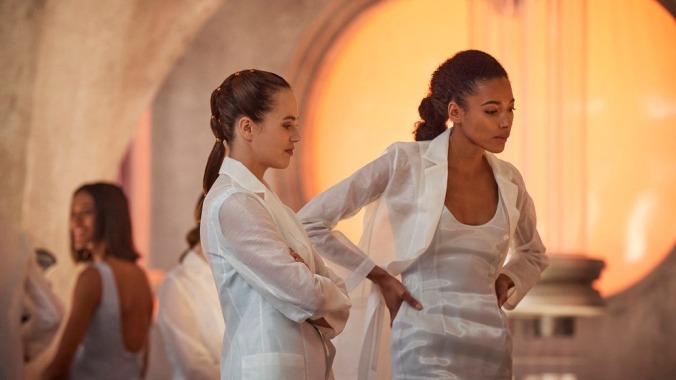Peacock’s Brave New World struggles to be more than just familiar


Peacock leans into timeliness with its inaugural lineup of original series: In addition to the surveillance drama of The Capture, the new streamer is offering up a Brave New World adaptation from Homecoming’s David Wiener. The latter, a lavishly produced sci-fi drama, languished in development at the Syfy and USA networks before making its way to Peacock, just waiting for the time when it could unleash the orgies, “feelies,” and calibrated dread of Aldous Huxley’s novel.
Huxley’s Brave New World is one of the defining dystopian works of the last century, but in his sendup of utilitarianism, the author couldn’t have anticipated how many of its details and themes would permeate (pop) culture or herald scientific advancements. Nor could he have guessed that the hypercontrolled setting of New London would inspire that of numerous sci-fi tales since. But Huxley’s influence is undeniable, which sets up an early obstacle for Wiener’s retelling: How do you make a template look compelling and new? And how do you set up that same story to compete with the high number of new shows—some in the same genre—debuting on a monthly, if not weekly, basis (in a non-pandemic year, that is)?
This Brave New World never quite emerges from its source material’s long shadow, which includes the penumbra of spiritual successors (or kin) like Westworld and Black Mirror. But the show’s superb cast certainly gives it all they’ve got as they navigate David Lee’s polished yet vaguely unnerving production design. New London was built on the ruins of the old one following some climate-related catastrophe, not that the Alphas who perch ever more precariously atop the city’s social hierarchy ever notice. It’s not their place to—an Alpha-Plus like Bernard Marx (Harry Lloyd) is responsible for the “social body,” which mostly means they’re supposed to reap all the benefits of being genetically engineered to be the best: the best-looking, the best positioned.
As in Huxley’s novel, there are five castes: Alpha, Beta, Gamma, Delta, and Epsilon. Under the guidance of World Controller Mustafa Mond (Nina Sosanya, effortlessly imperious in the gender-flipped role), the Alphas oversee New London, have sex with the Betas—who, in this interpretation, have absorbed that duty from the absent Freemartins—and are looked after by the three lower castes. Though we see what role every group has to play, Wiener focuses on the Alphas, Betas, and Epsilons to demonstrate the stark divide in this supposedly perfect society and highlight the growing connection between Bernard and Beta-Plus Lenina Crowne (Jessica Brown Findlay). We’re first introduced to the pair when Bernard, who serves as a counselor—i.e., dispenser of the mood stabilizer, soma—admonishes Lenina, a scientist in the “hatcheries,” for having too much sex with one person (Sen Mitsuji as Henry Foster, the most alpha of Alphas).
Bernard, an Alpha-Plus, is responsible for getting Lenina back on track (and back on the market), but there’s also an expectation that she already knows and accepts this. That’s life in New London: Everyone in their place, “Everybody happy now!” Yet, despite her enviable position and access to the ever-changing, body-conscious creations of costume designer Susie Coulthard, Lenina grapples with the notion of something… else out there in the world. Bernard shares her yearning, even if he doesn’t immediately recognize it. In the book, his short stature caused Bernard to doubt his Alpha-Plus standing in New London; here, he has no such concern, but Lloyd still stoops to emanate the insecurity that makes him susceptible to Lenina’s curiosity.
Just when it looks like we’ll be following Lenina and Bernard on some existential adventure or vacation sex, violence explodes in the Savage Lands, which Wiener has re-envisioned as a tourist trap instead of the reservation full of racist stereotypes from Huxley’s original telling. There, these New London toffs meet Linda (Demi Moore) and her son John (Alden Ehrenreich, in his first major role since Solo: A Star Wars Story), an increasingly brooding and, as portrayed here, very American man. John’s complicated past drives his story as he makes his way to New London, where he is gawked at and lusted over. Following the book’s design, Bernard’s, Lenina’s, and John’s storylines remain entangled for much of the nine-episode season, occasionally branching off to intertwine with those of Wilhelmina “Helm” Watson (Hannah John-Kamen, also shining in a gender-bent role), Henry, Frannie (Kylie Bunbury, woefully underused), and even the World Controller.
This Brave New World borrows from the novel’s explorations, or rather, critiques, of automation (though no one invokes Henry Ford) and conformity. But Wiener’s vision, and that of his fellow executive producer Grant Morrison, who also serves as a writer, is more action-packed than philosophical. Though still an outsider, their John is more rough and tumble than the man with Victorian sensibilities from the book. And while he rails against the surveillance state—represented here by an ocular implant that lets you see everyone’s status, a concept similar to that of Black Mirror’s “Nosedive”—John eventually warms to his ever-present audience, regaling them with fictional tales from the Savage Lands. It’s a significant departure from the uptight outcast of Huxley’s imagination: Once he’s settled in New London, Ehrenreich brings a little Han Solo swagger to John, but early on, he moons over girls and eschews careerism while listening to music like a 26th-century Lloyd Dobler. Gone is Shakespeare; John’s bard is now alternately Lou Reed, Nick Cave, or Thom Yorke.
That’s one of the more inspired touches in Wiener’s Brave New World, which can otherwise feel like a hodgepodge of the source material and more recent productions like Equilibrium, Gattaca, and even Snowpiercer (the novels and film), fomenting revolution as it does via a soulful Epsilon played by Joseph Morgan. The series wisely makes John more than just an oddity, which feeds the social body’s obsession with him. Wiener and his writers lend greater agency to all of the main characters, particularly Lenina, who is just as concerned with finding meaning as John. Findlay gives a wide-ranging, nuanced performance as Lenina, who is sometimes literally discovering an emotion for the first time. The widening of her eyes and little gasps of ecstasy never become perfunctory for Lenina, which is quite a feat, given the number of orgies she must attend as a Beta-Plus. Even Bernard is more than just a man flailing in his own sense of inadequacy; Lloyd certainly delves into his character’s grasping nature, but he manages to look pitiable and privileged at the same time.
But even its successful updates aren’t enough to make Brave New World especially innovative or bold. The show’s biggest ideas sound more like echoes of Westworld, with its rogue A.I. and twisted theme park. All its talk of viruses and anomalies recalls The Matrix and its sequels (there’s even a “Mother” and a “Father” to rebel against). And, with all due credit to intimacy coordinator Ita O’Brien, who orchestrates scene after scene of pulsing bodies under flashing lights, the frequent orgies become tiresome, which may or may not be the point—not to mention that, despite their massiveness, they still pale in comparison to the Zion freak fest. The show only begins to break away from its inspirations in its final hour, when storytellers and characters alike begin to wonder if they can’t choose something else, something more. Until then, Brave New World is caught in a feedback loop of references, one that only occasionally resonates with a culture in the midst of challenging systems, unseen and otherwise.